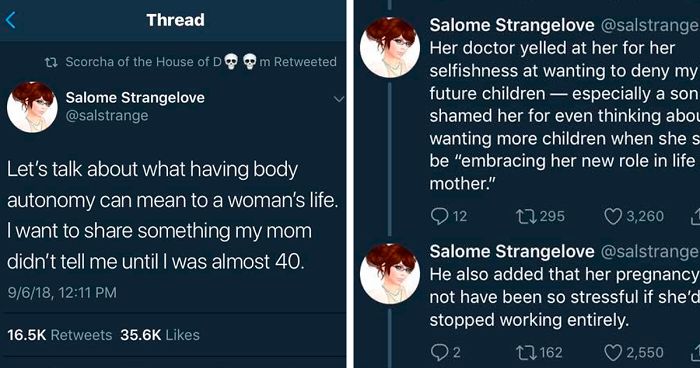
Woman Talks On The Importance Of Body Autonomy By Sharing Her Mom’s Experience With A Misogynist Doctor
‘Choice’ is a word that comes up frequently when discussing gender equality. A woman’s right to choose if she wants to work or stay at home, what she wears or the most hot button topic of all – choice over her reproductive and abortion rights. Body autonomy is something that men take for granted, but when you have people making laws or even health care specialists standing in your way, it is something that women cannot choose to ignore. Recently one woman tweeted out a thread telling the story of her mother, who had to battle some serious unwanted pregnancy risks all because she wasn’t given the right to choose.
Online user Salome Strangelove, a lyricist and poet, began the thread on her mother by sharing that even she hadn’t heard the heartbreaking medical care saga until she was almost 40-years-old.
The author and all of her siblings were a surprise to her young mother, writing, “I was an unplanned pregnancy. She didn’t plan any of her pregnancies, in fact, but she was unaware that her birth control was frequently being rendered ineffective by medication.”
For this reason, doctors should always ask their patients if they are taking any other medications. Medicines contain an enzyme called the P450 system which helps process hormones in birth control such as the pill, patch and the ring. However, other medicines can intervene by breaking up the hormones too fast – resulting in pregnancy.
Following the traumatic ordeal of giving birth, her mother asked if she could get a tubal ligation “her tubes tied” to prevent further risking her health with another pregnancy: “Tubal ligation is a surgical procedure that permanently closes or blocks your fallopian tubes.”
And while her doctor’s response may seem inappropriate and outdated, this is still a battle that women are fighting every day. In the U.S women ages, 21 and above have the right to this procedure, but they must sign a form, wait 30 days, and even with these steps, a doctor can still refuse.
According to a report from the Henry J. Kaiser Family Foundation: “Most states with a Family Planning waiver or SPA also cover the procedures for women, but there are exceptions. Ohio and Oregon do not cover tubal ligation (neither general nor post-partum) in their family planning programs. Connecticut, Georgia, Missouri, and Mississippi do not cover tubal ligation performed post-partum in their family planning programs, with Georgia noting that pregnant women are not enrolled in the state’s family planning waiver.”
It was not until the delivery of her brother that she was able to meet with another doctor about her request, “she did so in fear for her life convinced her next pregnancy might actually kill her.”
The young doctor was outraged at the previous medical care she had received and realized that her health issues went even deeper than she knew.
According to ACOG Committee on Ethics Opinion, Sterilization of Women, Including Those With Mental Disabilities there should be a system in place to prevent this type of medical negligence.
“Sterilization, like any other surgical procedure, must be carried out under the general ethical principles of respect for autonomy, beneficence, and justice. …The physician who objects to a patient’s request for sterilization solely as a matter of conscience must inform the patient that sterilization services may be available elsewhere and should refer the patient to another caregiver. …”
Out of 100 women who have a sterilization procedure each year, less than one may become pregnant.
Other women responded by sharing theirs and those they knew experiences of medical resistance
Image credits: t1stev
Image credits: good_grandma
Image credits: allicat1214
Image credits: viiith_nerve
Image credits: JudgmentAbounds
Image credits: francesthoughts
Image credits: texpatnj
143Kviews
Share on FacebookI have a lot of migraines due to misalignment in my back but I occasionally will have them because of my birth control too. I brought this up to my chiropractor who went into this whole discussion about how horrible birth control is and then essentially telling me it's my purpose as a woman to have children. He's no longer my chiropractor.
Not to mention that if you have back problems, getting pregnant would probably only make it worse.
Load More Replies...Anytime anyone male or female wants to be permanently rendered sterile doctors should just do it!!!!! Whether they already have kids or not! We have medicine, we know about germs, we don't need to work so hard at keeping the human race going. There are already too many of us.
Wish l could upvote your last sentence a hundred times. That's what l say when ever someone asks me why I don't want children.
Load More Replies...Unfortunately, this problem exists here as well, Lingon. I've heard many stories of swedish women who have to fight super hard to get sterilized. The arguments from doctors are all the same. "you're too young." "You'll change your mind" "you only have one child, you'll want a second one." "you only have two children, you'll want a third one" etc etc. It's ridiculous.
Load More Replies...I had menstrual issues for years. I saw 6 different doctors over a period of 22 years. They said the same thing: I just needed hormone pills. I dutifully took the ineffective pills. I became anemic from blood loss. Not one dr ever suggested hysterectomy: they all wanted me fertile, because I had no children. Dr 7 was different: he *listened.* I had a hysterectomy, and the pathologist found precancerous cells on my cervix. Drs 1-6 risked my life for breeding potential. Dr 7 respected my body autonomy.
I was going through menopause & having extremely heavy periods. They wanted to cauterize my uterus. They started me on iron pills in the meantime because I was anemic. I had no problem with the cauterization, but after taking iron, my period stopped. I stopped taking the iron after about a month & never went for the cauterization. My period came back, I started taking iron again & it went away again. I took iron for about 6 months after that, & my period never came back. When I Googled, I found that anemia can cause heavy bleeding. I already knew that heavy bleeding could cause anemia. Catch-22. If I hadn't lucked out on the iron, I would have had a procedure that I didn't even need. You would think the first treatment they would try would be the iron, I'm sure a procedure makes them more money.
Load More Replies...In India its still the same case. They still think husband or doctor should take such decision for the women.
Ah man, that made me angry beyond words. Religion and medicine SHOULD NOT MIX. I have someone quite close to me who is trans, but long before he realised that, he was struggling with gender dysphoria and suicidal ideation so he went to a doctor who correctly diagnosed it as such and then refused to do anything about it, because the doctor was an Orthodox Christian and it was "against the will of God"... In the end my friend had to emigrate to another country to get the care that he needed.
I totally understand that... it's going to be hell for me when I want top surgery, being genderqueer and all 🙄 Doctors are fine with breast reductions as long as you don't mention the word 'trans'. Then they're suddenly worried about your 'permanent decisions' or some b******t
Load More Replies...In 2016, following the birth of my second child and being 35 yrs old, I begged my ob/gyn for a tubal. SHE refused. I trusted her through 2 very difficult pregnancies and deliveries. I had many health issues, some related to my pregnancy and some not. I never went back to her for follow up care. 2016.
Aren't there laws that protect women who are in this situation? And if so, why aren't they being strictly enforced? Sorry for my ignorance, I'm in middle school and just recently started getting involved in politics and government.
Sadly there aren't. I had a classmate that never wanted kids. She while on birth control had three kids by 21. She begged for her tubes tied. Doc said no because she was too young. She didn't want the kids that she already had...had two more in the next 4 years. Finally he "allowed" her to get it done. Keep involved in politics. Keep informed. I don't care what direction you lean, just be part of the world you live in.
Load More Replies...my grandmother's mother got 12 or 13 child. and the last one almost killed her. the Church men still coming home and tell her to get more kids. her husband just throw him out. many religious men have no concern whatsoever.
Let the clerics get through the same issues like the women! What are this ignorant. Pedophiles thinking, Playing god? ......or devil? Care about your massive problems !
Load More Replies...If a doctor asked me "what if you change your mind?" I´d say "well, it would be MY f... problem, don´t you think?" My niece is 18yo and she says she doesn´t want to have children in the future. She wants to work, travel and have free time to do whatever the hell she wants. And I support her. Will she change her mind? Maybe, maybe not. The things is: It´s up to her, nobody else. Her decision, her life.
yeah, people don't disallow people from getting tattoos because 'what if you change your mind!" They understand that it's permanent, but go along anyway.
Load More Replies...F**k any and all anti-choicers, pro forced-birth, anti bodily autonomy. F**k them. They literally care more about a clump of cells than a living, breathing, THINKING person. When they insist that the fetus deserves rights, they are saying that a fetus can use a person's body without the pregnant person's permission. Even dead bodies have rights. You are placing DEAD BODIES over the rights of living pregnant people. So f**k you if you think this way. You can go to non-existent hell for all I care.
It's not about the fetuses, though. The gestation slavers hate women and want to make us suffer. They don't give a rat's a*s about a kid once it's born, and most of them would spit on a starving kid in the gutter if it got in their way. Never forget this. Women are their target.
Load More Replies...I have a chronic incurable disorder, and if I ever got pregnant it could spread the disease to my organs and kill me. When I was 21 my husband and I went to a Dr to see about getting sterilized, I got up on the table and waited...and waited, eventually his nurse comes back in and says Dr is refusing to see me because of my age. It didn't matter that I could be killed by a pregnancy, it didn't matter that I did not want kids anyways and it certainly didn't matter that I was legal age for the procedure or married. Only my age mattered. It took 5 more years of fighting to find a doctor that agreed to sterilize me. Women go through this kind of garbage far too often and it is sickening.
I'm 35 and I really do not want any kids. People keep telling me all kinda of b******t about this. Like that I do want kids - I'm just not aware of it yet, I'll regret it, I'll change my mind when I'm 80, bla bla. I am 35 years old! I DO NOT WANT TO HAVE KIDS.
I just had the 20th anniversary of my 35th birthday. I've aged out of most of the yapping - but people are nasty a******s when you tell them you don't want kids. After awhile, I just smiled and asked them when they were planning to retire....because I'll be doing that ten years earlier than they can.
Load More Replies...How much longer would it take for some people to realise that religions are just legalised madness. I'm grateful for the choice modern women enjoy, and I'm sorry for the poor women who had to go through hell in the past.
It isn’t religion that’s madness, religion is itself a choice. The issue is people pushing religion on others.
Load More Replies...After our second pregnancy in a very short period of time, my HUSBAND went to get his tubes tied, or whatever it's called. He was mid twenties, so young. The doctor quizzed him a long time about "what if you change your mind?" Thankfully no one asked him about having a son (we have awesome girls). He looked at the doctor and said "I'm super close to my sister. She was adopted. If I want more kids, we will adopt." Sheesh. There are more options than one.
It’s a vasectomy. My dad had one. He was in his 40’s though, as was my mom, and nobody was concerned about him changing his mind.
Load More Replies...Not as serious,but in the same ilk-I went to enquire about a breast reuction.I have had large breasts since I was 11 and have developed serious back,neck and breathing issues.I said to the Dr that I wanted "as much as possible" removed.Only to be told "we we'll have to see what you Husband thinks about that"....Welcome to the 21century Ladies :/
Man, I would have laid into him for that, and then left the room and informed everyone in the waiting room what he just said to me, advising them to see someone else if they wanted their decisions respected. A**hole.
Load More Replies...Myself and my 3rd child almost died when I was giving birth.I was advised not to have more children.About 4mhs later,I discovered I was pregnant(I had been on the pill the entire time ,had two small children & a tiny baby,was still recovering physically/mentally from the birth).I went to enquire about an abortion(I live in a country where that is perfectly legal and on the PBS).Only to be told by the young male Dr,"Well I'm not going to tell you, you can't have an abortion,but you do need to remember you will be murdering your child".He then sent me for an ultrasound ,without including the information for the technician that is supposed to be added when a temination is being considered.So after hearing "theres babies hand","nice strong heartbeat" etc, I sat in the carpark and exhaustedly sobbed.After an horrenous pregnacy,I did however successfully give birth to my youngest daughter.My Husband had a vasectomy 1 week later.Noone told him he couldn't.
I exactly know this feeling. I was diagnosed with premature ovarian failure when I was 17 after being symptomatic for 5 years. At (now) 30 years old, I have been post menopausal for over 15 years. I want a hysterectomy, but am "too young" to make "such a permanent decision". I underwent high dose fertility treatment to prove a point. Months later, when I did not show a single follicle worth harvesting and my endrometium demonstrated that it was not capable of sustaining life/pregnancy even with a donor, I was still denied. Even with a family history of cervical cancer and a personal history of precancerous Pap smears... I am still denied. All because I may someday "change my mind" and decide to pay $40k to miscarry a donor egg. I mean... COME. THE. F*CK. ON. Really?! Take the nonfunctional organ out already. Jibbers crabst.
I'm so glad and proud that my country (the Republic of Ireland) finally grew up and came out of the shadow of the crozier, the Catholic Church, and voted in favour of same sex marriage and abortion. I voted in favour of both. As most Irish people said before the referendums, if you don't want a same sex marriage or an abortion then don't have one, but don't deny others their right to a happy life and bodily autonomy.
Reading these comments makes me so glad I'm an assertive person. I won't go into what led up to it, but I got a tubal in South Carolina at the age of 24 in 1974. Of course the doctor said no--at first--but I pitched what you might call an hysterical fit. Doctors in those days didn't know what to do with a woman who did that instead of saying, "Yes, sir," so I got my way.
Well placed fake hysterics have cowed many a jerkwad man.
Load More Replies...My aunt had to get a hysterectomy after her 3rd child because of severe complications and an infection. Her priest told her that she would never go to heaven because she "allowed" the doctors to perform a hysterectomy (as opposed to letting her die?). She ended up in a mental hospital (in Ireland, in the 1960's) for over a year. She never totally recovered from that. I'm pretty sure she still thinks she's going to hell because of it.
I am so sorry for what your aunt went through. That is beyond horrifying.
Load More Replies...I just wish karma could make every man who behaves like her original doctor pregnant.
Oh yes. And not the kind of oregnancy that feels like a breeze. The kind with 6 month long nausea and all the works!
Load More Replies...Quite recently there was a post on Reddit from a woman who was getting this same push-back about getting a tubal ligation - in this day and age! I wrote a supportive comment and was accused of being a "baby killer" by some loon who apparently doesn't know the difference between TL and abortion. Another person compared the poster to someone who wanted to have a healthy arm or leg lopped off for no reason. Sigh.
My grandfather was raised a staunch catholic, (his mother wanted him to become a priest) he was in the military stationed in Germany in the mid 1950's, when he heard a woman begging the priest for permission to use birth control as she had 3 young children and had almost died each time...the priest said no. My grandfather never stepped foot in a Catholic Church again and helped to raise us to question authority, in all forms
My grandmother had 6 miscarriages. My grandfather never took her to the Catholic Hospital because they both know they would focus on the baby and let her die
Load More Replies...I don't want children and for various personal reasons regarding mine and partners medical and family medical history don't want them. I would like to not be on birth control for the rest of my life but I would also like to not be shamed about 'wasting my organs' 'there are people in this world who can't have kids' I'm sorry for them but I refuse to feel guilty for my choice
And you shouldn't be shamed for making your own decision. It's your body and you owe no one any explanation. Sending hugs and positive vibs
Load More Replies...I suspect I may be accused of missing the point of this post, but I just cannot let ignorance/misinformation like this pass: medicines DO NOT “contain an enzyme called the P450 system”. The cytochrome P450 system refers to series of enzymes in human cells which function (predominantly in the liver) to metabolize ingested compounds (such as medications). “Other medicines” DO NOT “intervene by breaking up the hormones too fast”, but certain medications (and other chemicals/compounds) can serve as activators of the P450 system in the liver, causing other meds to be metabolized faster and thereby decreasing their efficacy.
I requested sterilization after having my son in the mid nineties because of the pain of having blood back up into my ovaries and them swelling to the size of golf balls every single time I had my period. It seemed the best thing to do to stop the pain. They refused because I was too young and would want more children someday
Had a tubal ligation at 22, after 2 babies. Had to sign my release 6 months in advance. This was 1988- God bless California.
I hate it so much when other Christians act like complete shits and disrespect women, the LGBTQ community, or people who have different religions than them. Christians who do that make the rest of the world think that all Christians are unaccepting and unsupportive of anyone not like them. People should be able to live however they feel most comfortable, and more Christians should learn to respect people who believe different than them.
As Christian, I believe that one of the points of our lives in Earth is to have and to raise children, but these stories enrage me. Noone should be forced to have children against their will. I think the worst part is the approach of those doctors. I am pretty sure that doctors are meant to do what's the best for their patients, not what's the best for themselves. They can naturally disagree with something that is against their conscience, but to push their believes on patients, manipulate them and even put their lives in dangers is something which should be punished.
There are way too many people on this planet already. So much so it won't be able to support us anymore.
Load More Replies...I've had rupturing ovarian cysts since 1996, I've had three pregnancies, and I finally, after asking for 10 years, got my hysterectomy today! Turns out my uterus was full of glands that were bordering on endometriosis, so yay me for not backing down, but it took 10 years!
So... Unfortunately in Poland sterilization is ban by law. Of course only for women. I don't want to have kids. Never wanted. But still I have to live in fear if my contraception works.
Women make up half the population. How is it, that over time, our voices and our rights have become more and more diminished? We started as hunter-gatherers. Such societies are egalitarian...everyone is equal. Across the globe, women are treated worse and worse on average every century. Why do we ALLOW IT?!
We've been getting better over the course of the last 150 years actually.
Load More Replies...When I was in my early twenties, I asked my gynecologist about getting my tubes tied. I KNEW I did not want children. He said no doctor would do that for me because I was young and I might change my mind later. He did not state any religious reasons, he just refused to discuss the possibility with me. When I was in my late twenties, I got pregnant (despite being on the pill). I terminated the pregnancy and then asked again about getting my tubes tied. I was told again that I was too young and I might change my mind later. I started getting scared to have sex; I didn't want to get pregnant again. I didn't know that I could "shop around" for a doctor who would support my decision. I was led to believe that no one would help me.
One of my friends has von Willebrand's disease, which is one of the hemophilias. She had so much bleeding with both of her deliveries that she was able to get her tubes tied in 1970 after only the two pregnancies. At that time you had to have 4(!) children before doctors would tie your tubes (this was in Wisconsin, and I don''t know if it was actually state law, or just a convention with the doctors); her roommate had just had her fourth baby, ##3 and#4 unplanned, and was waiting to have her tubal ligation also. My friend considered herself lucky that the doctors concluded she might bleed to death if forced to go through any more pregnancies!
Sonka, over a span of 20 years, I was placed on over 100 different medications. Some had no effect, some made me non functional, and NONE of them helped my menstrual problems. I knew I never wanted children. My only options were hormone shots or surgery. Several doctors flat out told me they wouldn't consider ANY surgery until I'd had a child. Each time, I'd find a different doctor.
The story with the woman who was told she should try for a boy, even though it might kill her. Unbelievable. Women are treated like worthless objects, all over the world, just in varying degrees. Until they give birth to a boy, then they are valued adn respected. But only as mothers, not as actual persons. Posts like this one make me want to go and set something on fire.
Tbh I stopped reading after she asked her Catholic doctor about birth control...
And a lot of people change their mind about having children, when they have them they wish they didn't...
not only to get sterilized, the simple thought of a woman not poping out children one after another freaks out ObGyns. Every tim I go to the doctor they would only tell me that I am running out of time, even if they meet me for the first time. They don't know if I have a husband, if I have enough money or if I have other health issues. They look at me as a walking womb.
@Sage Jay. I totally agree with your motto and your parents' wise word. Unfortunately, many lives have been destroyed in the name of religions. Child sexual abuse in priests hands, denouncing LGBTQ community less than human, death if one dares to leave a religion, and the list goes on. Hence, my initial comment
How ignorant of you to lump all religions into one...
Load More Replies...What does being white or a man have to do with someone that sucks at his job and gave bad advice again? All men are evil? All white men are evil and religious? I admit the story sucks but making such generalizations is beyond stupid and makes me care less about the story itself just because it's trying to make all white men guilty of something they clearly didn't do, otherwise race and gender wouldn't have been mentioned.
That detail might seem unimportant to the story, but it reflects a problem in representation. We have dudes talking about things they absolutely know nothing about. If we had women in power and they'd enforce a lifestyle that forced men to receive a kick in the nuts every morning (for whatever reason), we'd be pretty upset about that too. It's my body, I chose what to do with it. What I put into it, and what I chose to squeeze out of it. She's not saying white men are evil. She's saying white men are ruling over a (non white? Not sure) woman's body as if they're deciding how many airbags a vehicle needs to have. Don't get butthurt every time, try to see the story from another point of view other than your own. BTW ... I'm white and I'm male.
Load More Replies...how the f**k do you think this is about race? Get over yourself.
Load More Replies...Yes, because *suggesting* a medical procedure is equivalent to risking a woman's physical and mental well being because of personal opinions.
Load More Replies...Misogyny comes in all nationalities, races, communities, genders...unfortunately
Load More Replies...Thank you for demonstrating to us yet again that stupid f*****s are stupid. There's one every day, and you're it. ...///... Here's your prize. *smack to the nose with a newspaper* Now go play in the traffic, kid, the grownups are talking.
Load More Replies...You again. I’m not going to even bother with your c**p. Girls are meant for so much more than male enjoyment.
Load More Replies...I have a lot of migraines due to misalignment in my back but I occasionally will have them because of my birth control too. I brought this up to my chiropractor who went into this whole discussion about how horrible birth control is and then essentially telling me it's my purpose as a woman to have children. He's no longer my chiropractor.
Not to mention that if you have back problems, getting pregnant would probably only make it worse.
Load More Replies...Anytime anyone male or female wants to be permanently rendered sterile doctors should just do it!!!!! Whether they already have kids or not! We have medicine, we know about germs, we don't need to work so hard at keeping the human race going. There are already too many of us.
Wish l could upvote your last sentence a hundred times. That's what l say when ever someone asks me why I don't want children.
Load More Replies...Unfortunately, this problem exists here as well, Lingon. I've heard many stories of swedish women who have to fight super hard to get sterilized. The arguments from doctors are all the same. "you're too young." "You'll change your mind" "you only have one child, you'll want a second one." "you only have two children, you'll want a third one" etc etc. It's ridiculous.
Load More Replies...I had menstrual issues for years. I saw 6 different doctors over a period of 22 years. They said the same thing: I just needed hormone pills. I dutifully took the ineffective pills. I became anemic from blood loss. Not one dr ever suggested hysterectomy: they all wanted me fertile, because I had no children. Dr 7 was different: he *listened.* I had a hysterectomy, and the pathologist found precancerous cells on my cervix. Drs 1-6 risked my life for breeding potential. Dr 7 respected my body autonomy.
I was going through menopause & having extremely heavy periods. They wanted to cauterize my uterus. They started me on iron pills in the meantime because I was anemic. I had no problem with the cauterization, but after taking iron, my period stopped. I stopped taking the iron after about a month & never went for the cauterization. My period came back, I started taking iron again & it went away again. I took iron for about 6 months after that, & my period never came back. When I Googled, I found that anemia can cause heavy bleeding. I already knew that heavy bleeding could cause anemia. Catch-22. If I hadn't lucked out on the iron, I would have had a procedure that I didn't even need. You would think the first treatment they would try would be the iron, I'm sure a procedure makes them more money.
Load More Replies...In India its still the same case. They still think husband or doctor should take such decision for the women.
Ah man, that made me angry beyond words. Religion and medicine SHOULD NOT MIX. I have someone quite close to me who is trans, but long before he realised that, he was struggling with gender dysphoria and suicidal ideation so he went to a doctor who correctly diagnosed it as such and then refused to do anything about it, because the doctor was an Orthodox Christian and it was "against the will of God"... In the end my friend had to emigrate to another country to get the care that he needed.
I totally understand that... it's going to be hell for me when I want top surgery, being genderqueer and all 🙄 Doctors are fine with breast reductions as long as you don't mention the word 'trans'. Then they're suddenly worried about your 'permanent decisions' or some b******t
Load More Replies...In 2016, following the birth of my second child and being 35 yrs old, I begged my ob/gyn for a tubal. SHE refused. I trusted her through 2 very difficult pregnancies and deliveries. I had many health issues, some related to my pregnancy and some not. I never went back to her for follow up care. 2016.
Aren't there laws that protect women who are in this situation? And if so, why aren't they being strictly enforced? Sorry for my ignorance, I'm in middle school and just recently started getting involved in politics and government.
Sadly there aren't. I had a classmate that never wanted kids. She while on birth control had three kids by 21. She begged for her tubes tied. Doc said no because she was too young. She didn't want the kids that she already had...had two more in the next 4 years. Finally he "allowed" her to get it done. Keep involved in politics. Keep informed. I don't care what direction you lean, just be part of the world you live in.
Load More Replies...my grandmother's mother got 12 or 13 child. and the last one almost killed her. the Church men still coming home and tell her to get more kids. her husband just throw him out. many religious men have no concern whatsoever.
Let the clerics get through the same issues like the women! What are this ignorant. Pedophiles thinking, Playing god? ......or devil? Care about your massive problems !
Load More Replies...If a doctor asked me "what if you change your mind?" I´d say "well, it would be MY f... problem, don´t you think?" My niece is 18yo and she says she doesn´t want to have children in the future. She wants to work, travel and have free time to do whatever the hell she wants. And I support her. Will she change her mind? Maybe, maybe not. The things is: It´s up to her, nobody else. Her decision, her life.
yeah, people don't disallow people from getting tattoos because 'what if you change your mind!" They understand that it's permanent, but go along anyway.
Load More Replies...F**k any and all anti-choicers, pro forced-birth, anti bodily autonomy. F**k them. They literally care more about a clump of cells than a living, breathing, THINKING person. When they insist that the fetus deserves rights, they are saying that a fetus can use a person's body without the pregnant person's permission. Even dead bodies have rights. You are placing DEAD BODIES over the rights of living pregnant people. So f**k you if you think this way. You can go to non-existent hell for all I care.
It's not about the fetuses, though. The gestation slavers hate women and want to make us suffer. They don't give a rat's a*s about a kid once it's born, and most of them would spit on a starving kid in the gutter if it got in their way. Never forget this. Women are their target.
Load More Replies...I have a chronic incurable disorder, and if I ever got pregnant it could spread the disease to my organs and kill me. When I was 21 my husband and I went to a Dr to see about getting sterilized, I got up on the table and waited...and waited, eventually his nurse comes back in and says Dr is refusing to see me because of my age. It didn't matter that I could be killed by a pregnancy, it didn't matter that I did not want kids anyways and it certainly didn't matter that I was legal age for the procedure or married. Only my age mattered. It took 5 more years of fighting to find a doctor that agreed to sterilize me. Women go through this kind of garbage far too often and it is sickening.
I'm 35 and I really do not want any kids. People keep telling me all kinda of b******t about this. Like that I do want kids - I'm just not aware of it yet, I'll regret it, I'll change my mind when I'm 80, bla bla. I am 35 years old! I DO NOT WANT TO HAVE KIDS.
I just had the 20th anniversary of my 35th birthday. I've aged out of most of the yapping - but people are nasty a******s when you tell them you don't want kids. After awhile, I just smiled and asked them when they were planning to retire....because I'll be doing that ten years earlier than they can.
Load More Replies...How much longer would it take for some people to realise that religions are just legalised madness. I'm grateful for the choice modern women enjoy, and I'm sorry for the poor women who had to go through hell in the past.
It isn’t religion that’s madness, religion is itself a choice. The issue is people pushing religion on others.
Load More Replies...After our second pregnancy in a very short period of time, my HUSBAND went to get his tubes tied, or whatever it's called. He was mid twenties, so young. The doctor quizzed him a long time about "what if you change your mind?" Thankfully no one asked him about having a son (we have awesome girls). He looked at the doctor and said "I'm super close to my sister. She was adopted. If I want more kids, we will adopt." Sheesh. There are more options than one.
It’s a vasectomy. My dad had one. He was in his 40’s though, as was my mom, and nobody was concerned about him changing his mind.
Load More Replies...Not as serious,but in the same ilk-I went to enquire about a breast reuction.I have had large breasts since I was 11 and have developed serious back,neck and breathing issues.I said to the Dr that I wanted "as much as possible" removed.Only to be told "we we'll have to see what you Husband thinks about that"....Welcome to the 21century Ladies :/
Man, I would have laid into him for that, and then left the room and informed everyone in the waiting room what he just said to me, advising them to see someone else if they wanted their decisions respected. A**hole.
Load More Replies...Myself and my 3rd child almost died when I was giving birth.I was advised not to have more children.About 4mhs later,I discovered I was pregnant(I had been on the pill the entire time ,had two small children & a tiny baby,was still recovering physically/mentally from the birth).I went to enquire about an abortion(I live in a country where that is perfectly legal and on the PBS).Only to be told by the young male Dr,"Well I'm not going to tell you, you can't have an abortion,but you do need to remember you will be murdering your child".He then sent me for an ultrasound ,without including the information for the technician that is supposed to be added when a temination is being considered.So after hearing "theres babies hand","nice strong heartbeat" etc, I sat in the carpark and exhaustedly sobbed.After an horrenous pregnacy,I did however successfully give birth to my youngest daughter.My Husband had a vasectomy 1 week later.Noone told him he couldn't.
I exactly know this feeling. I was diagnosed with premature ovarian failure when I was 17 after being symptomatic for 5 years. At (now) 30 years old, I have been post menopausal for over 15 years. I want a hysterectomy, but am "too young" to make "such a permanent decision". I underwent high dose fertility treatment to prove a point. Months later, when I did not show a single follicle worth harvesting and my endrometium demonstrated that it was not capable of sustaining life/pregnancy even with a donor, I was still denied. Even with a family history of cervical cancer and a personal history of precancerous Pap smears... I am still denied. All because I may someday "change my mind" and decide to pay $40k to miscarry a donor egg. I mean... COME. THE. F*CK. ON. Really?! Take the nonfunctional organ out already. Jibbers crabst.
I'm so glad and proud that my country (the Republic of Ireland) finally grew up and came out of the shadow of the crozier, the Catholic Church, and voted in favour of same sex marriage and abortion. I voted in favour of both. As most Irish people said before the referendums, if you don't want a same sex marriage or an abortion then don't have one, but don't deny others their right to a happy life and bodily autonomy.
Reading these comments makes me so glad I'm an assertive person. I won't go into what led up to it, but I got a tubal in South Carolina at the age of 24 in 1974. Of course the doctor said no--at first--but I pitched what you might call an hysterical fit. Doctors in those days didn't know what to do with a woman who did that instead of saying, "Yes, sir," so I got my way.
Well placed fake hysterics have cowed many a jerkwad man.
Load More Replies...My aunt had to get a hysterectomy after her 3rd child because of severe complications and an infection. Her priest told her that she would never go to heaven because she "allowed" the doctors to perform a hysterectomy (as opposed to letting her die?). She ended up in a mental hospital (in Ireland, in the 1960's) for over a year. She never totally recovered from that. I'm pretty sure she still thinks she's going to hell because of it.
I am so sorry for what your aunt went through. That is beyond horrifying.
Load More Replies...I just wish karma could make every man who behaves like her original doctor pregnant.
Oh yes. And not the kind of oregnancy that feels like a breeze. The kind with 6 month long nausea and all the works!
Load More Replies...Quite recently there was a post on Reddit from a woman who was getting this same push-back about getting a tubal ligation - in this day and age! I wrote a supportive comment and was accused of being a "baby killer" by some loon who apparently doesn't know the difference between TL and abortion. Another person compared the poster to someone who wanted to have a healthy arm or leg lopped off for no reason. Sigh.
My grandfather was raised a staunch catholic, (his mother wanted him to become a priest) he was in the military stationed in Germany in the mid 1950's, when he heard a woman begging the priest for permission to use birth control as she had 3 young children and had almost died each time...the priest said no. My grandfather never stepped foot in a Catholic Church again and helped to raise us to question authority, in all forms
My grandmother had 6 miscarriages. My grandfather never took her to the Catholic Hospital because they both know they would focus on the baby and let her die
Load More Replies...I don't want children and for various personal reasons regarding mine and partners medical and family medical history don't want them. I would like to not be on birth control for the rest of my life but I would also like to not be shamed about 'wasting my organs' 'there are people in this world who can't have kids' I'm sorry for them but I refuse to feel guilty for my choice
And you shouldn't be shamed for making your own decision. It's your body and you owe no one any explanation. Sending hugs and positive vibs
Load More Replies...I suspect I may be accused of missing the point of this post, but I just cannot let ignorance/misinformation like this pass: medicines DO NOT “contain an enzyme called the P450 system”. The cytochrome P450 system refers to series of enzymes in human cells which function (predominantly in the liver) to metabolize ingested compounds (such as medications). “Other medicines” DO NOT “intervene by breaking up the hormones too fast”, but certain medications (and other chemicals/compounds) can serve as activators of the P450 system in the liver, causing other meds to be metabolized faster and thereby decreasing their efficacy.
I requested sterilization after having my son in the mid nineties because of the pain of having blood back up into my ovaries and them swelling to the size of golf balls every single time I had my period. It seemed the best thing to do to stop the pain. They refused because I was too young and would want more children someday
Had a tubal ligation at 22, after 2 babies. Had to sign my release 6 months in advance. This was 1988- God bless California.
I hate it so much when other Christians act like complete shits and disrespect women, the LGBTQ community, or people who have different religions than them. Christians who do that make the rest of the world think that all Christians are unaccepting and unsupportive of anyone not like them. People should be able to live however they feel most comfortable, and more Christians should learn to respect people who believe different than them.
As Christian, I believe that one of the points of our lives in Earth is to have and to raise children, but these stories enrage me. Noone should be forced to have children against their will. I think the worst part is the approach of those doctors. I am pretty sure that doctors are meant to do what's the best for their patients, not what's the best for themselves. They can naturally disagree with something that is against their conscience, but to push their believes on patients, manipulate them and even put their lives in dangers is something which should be punished.
There are way too many people on this planet already. So much so it won't be able to support us anymore.
Load More Replies...I've had rupturing ovarian cysts since 1996, I've had three pregnancies, and I finally, after asking for 10 years, got my hysterectomy today! Turns out my uterus was full of glands that were bordering on endometriosis, so yay me for not backing down, but it took 10 years!
So... Unfortunately in Poland sterilization is ban by law. Of course only for women. I don't want to have kids. Never wanted. But still I have to live in fear if my contraception works.
Women make up half the population. How is it, that over time, our voices and our rights have become more and more diminished? We started as hunter-gatherers. Such societies are egalitarian...everyone is equal. Across the globe, women are treated worse and worse on average every century. Why do we ALLOW IT?!
We've been getting better over the course of the last 150 years actually.
Load More Replies...When I was in my early twenties, I asked my gynecologist about getting my tubes tied. I KNEW I did not want children. He said no doctor would do that for me because I was young and I might change my mind later. He did not state any religious reasons, he just refused to discuss the possibility with me. When I was in my late twenties, I got pregnant (despite being on the pill). I terminated the pregnancy and then asked again about getting my tubes tied. I was told again that I was too young and I might change my mind later. I started getting scared to have sex; I didn't want to get pregnant again. I didn't know that I could "shop around" for a doctor who would support my decision. I was led to believe that no one would help me.
One of my friends has von Willebrand's disease, which is one of the hemophilias. She had so much bleeding with both of her deliveries that she was able to get her tubes tied in 1970 after only the two pregnancies. At that time you had to have 4(!) children before doctors would tie your tubes (this was in Wisconsin, and I don''t know if it was actually state law, or just a convention with the doctors); her roommate had just had her fourth baby, ##3 and#4 unplanned, and was waiting to have her tubal ligation also. My friend considered herself lucky that the doctors concluded she might bleed to death if forced to go through any more pregnancies!
Sonka, over a span of 20 years, I was placed on over 100 different medications. Some had no effect, some made me non functional, and NONE of them helped my menstrual problems. I knew I never wanted children. My only options were hormone shots or surgery. Several doctors flat out told me they wouldn't consider ANY surgery until I'd had a child. Each time, I'd find a different doctor.
The story with the woman who was told she should try for a boy, even though it might kill her. Unbelievable. Women are treated like worthless objects, all over the world, just in varying degrees. Until they give birth to a boy, then they are valued adn respected. But only as mothers, not as actual persons. Posts like this one make me want to go and set something on fire.
Tbh I stopped reading after she asked her Catholic doctor about birth control...
And a lot of people change their mind about having children, when they have them they wish they didn't...
not only to get sterilized, the simple thought of a woman not poping out children one after another freaks out ObGyns. Every tim I go to the doctor they would only tell me that I am running out of time, even if they meet me for the first time. They don't know if I have a husband, if I have enough money or if I have other health issues. They look at me as a walking womb.
@Sage Jay. I totally agree with your motto and your parents' wise word. Unfortunately, many lives have been destroyed in the name of religions. Child sexual abuse in priests hands, denouncing LGBTQ community less than human, death if one dares to leave a religion, and the list goes on. Hence, my initial comment
How ignorant of you to lump all religions into one...
Load More Replies...What does being white or a man have to do with someone that sucks at his job and gave bad advice again? All men are evil? All white men are evil and religious? I admit the story sucks but making such generalizations is beyond stupid and makes me care less about the story itself just because it's trying to make all white men guilty of something they clearly didn't do, otherwise race and gender wouldn't have been mentioned.
That detail might seem unimportant to the story, but it reflects a problem in representation. We have dudes talking about things they absolutely know nothing about. If we had women in power and they'd enforce a lifestyle that forced men to receive a kick in the nuts every morning (for whatever reason), we'd be pretty upset about that too. It's my body, I chose what to do with it. What I put into it, and what I chose to squeeze out of it. She's not saying white men are evil. She's saying white men are ruling over a (non white? Not sure) woman's body as if they're deciding how many airbags a vehicle needs to have. Don't get butthurt every time, try to see the story from another point of view other than your own. BTW ... I'm white and I'm male.
Load More Replies...how the f**k do you think this is about race? Get over yourself.
Load More Replies...Yes, because *suggesting* a medical procedure is equivalent to risking a woman's physical and mental well being because of personal opinions.
Load More Replies...Misogyny comes in all nationalities, races, communities, genders...unfortunately
Load More Replies...Thank you for demonstrating to us yet again that stupid f*****s are stupid. There's one every day, and you're it. ...///... Here's your prize. *smack to the nose with a newspaper* Now go play in the traffic, kid, the grownups are talking.
Load More Replies...You again. I’m not going to even bother with your c**p. Girls are meant for so much more than male enjoyment.
Load More Replies...
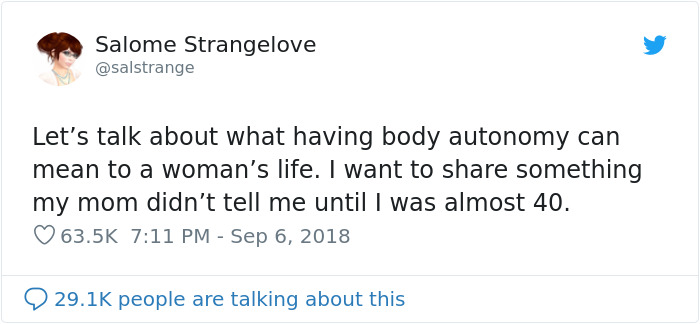

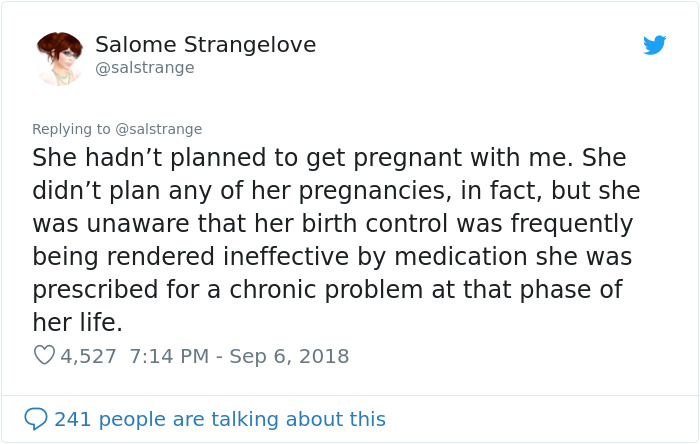
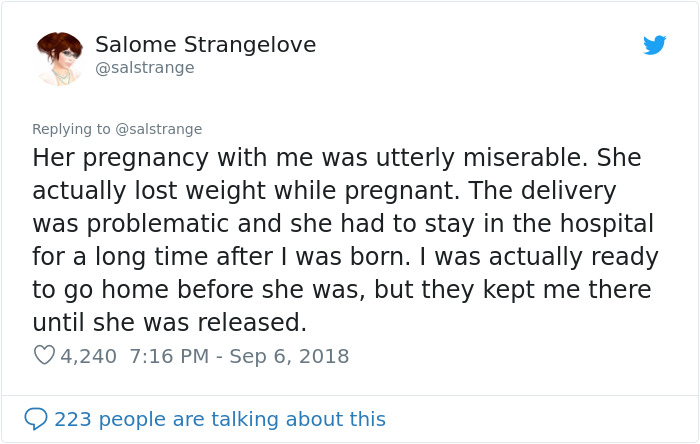
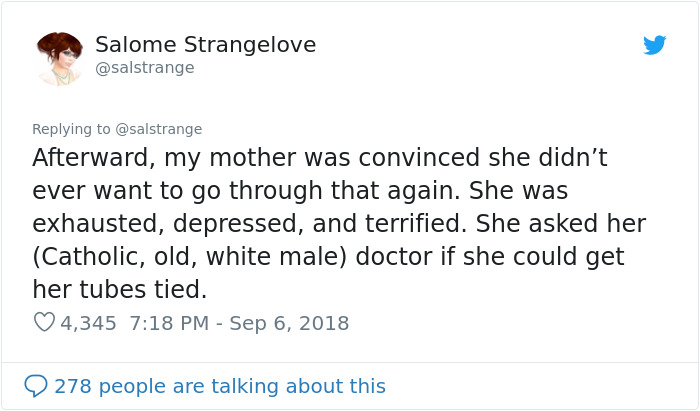
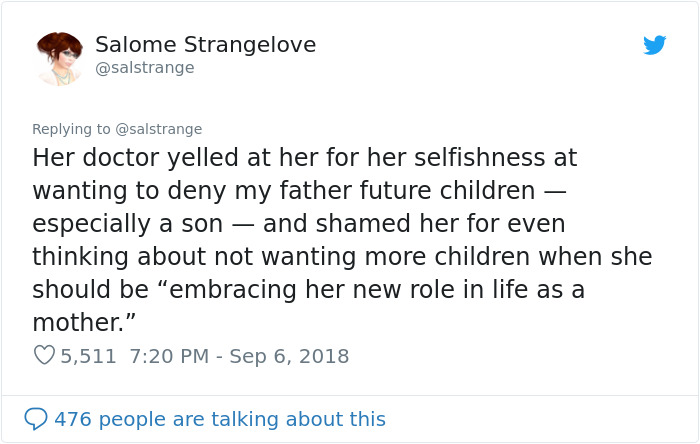
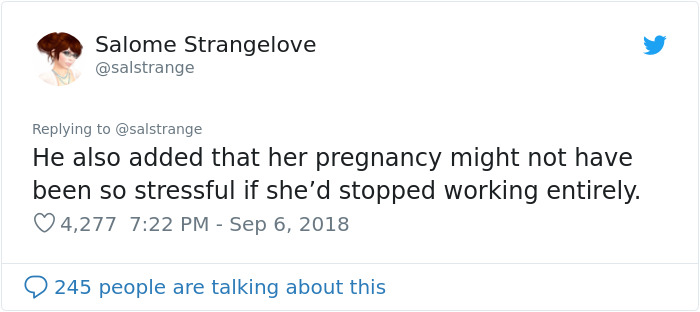
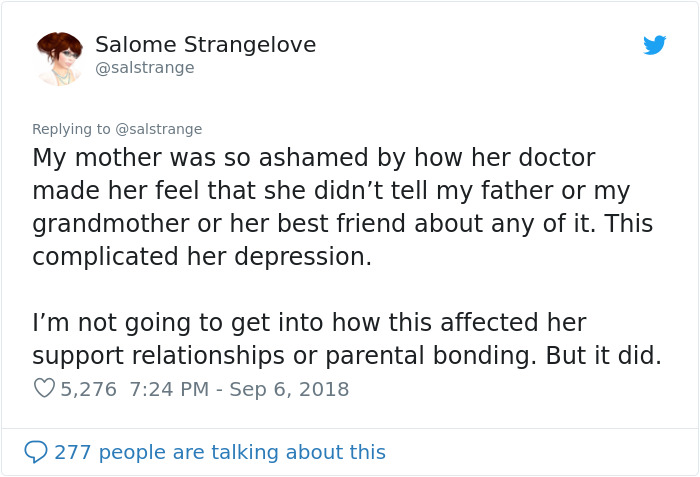
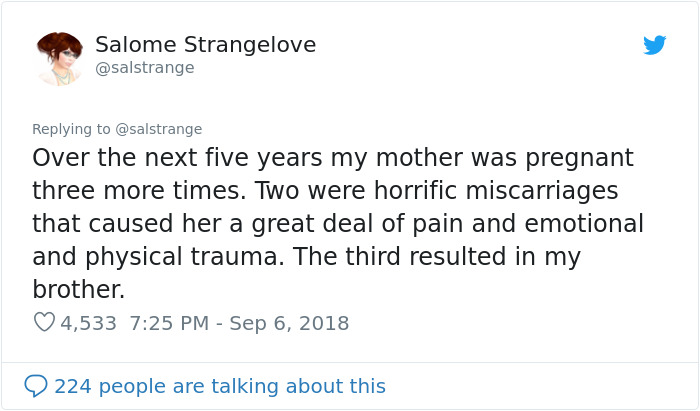
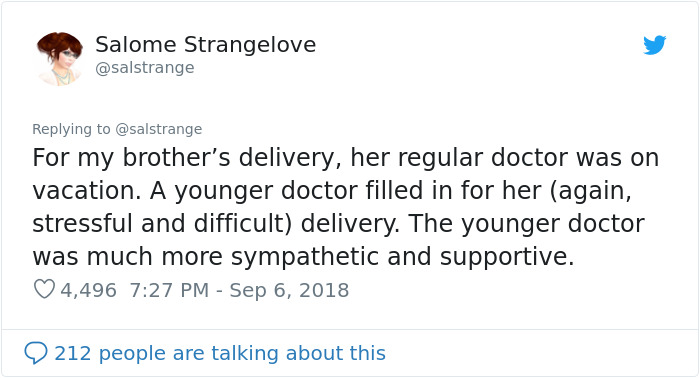
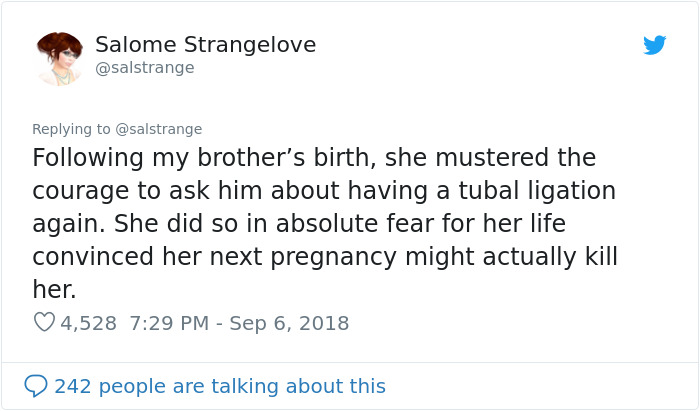
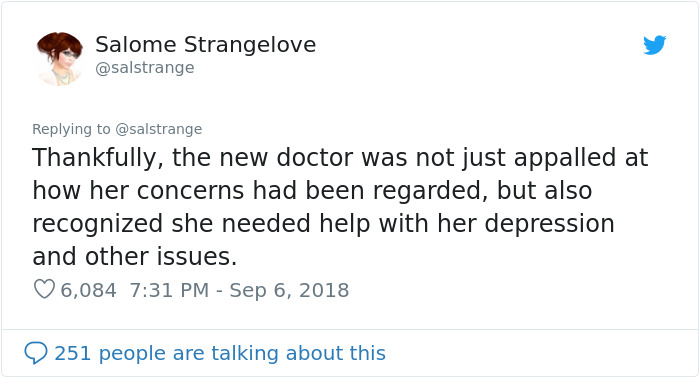
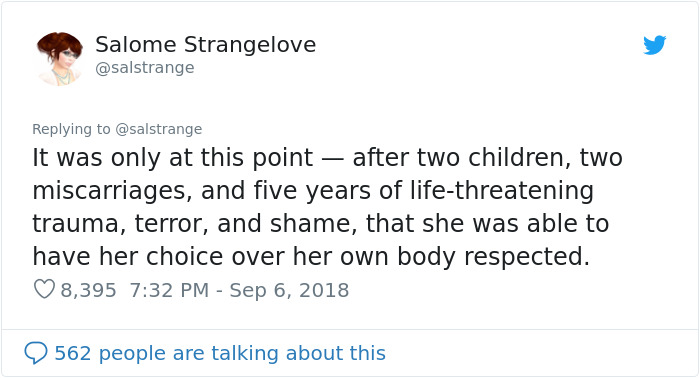

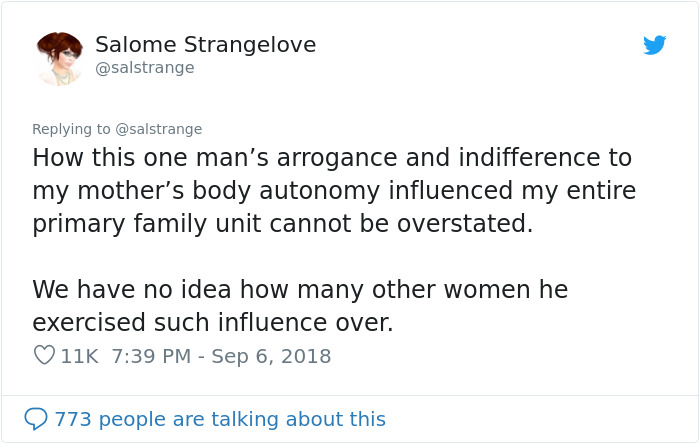


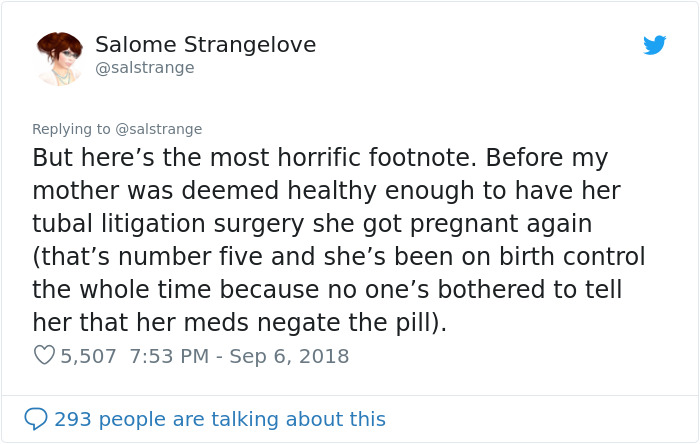
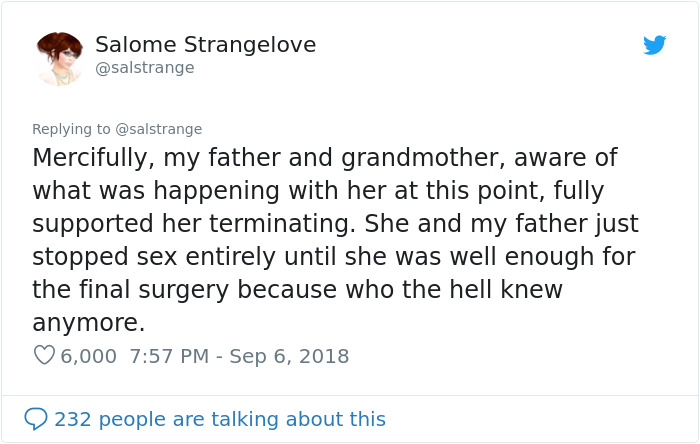
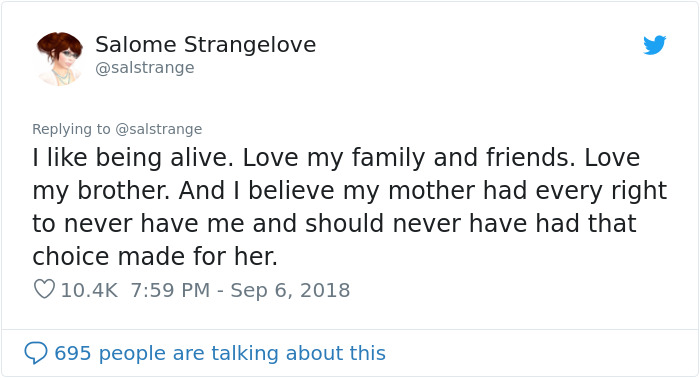
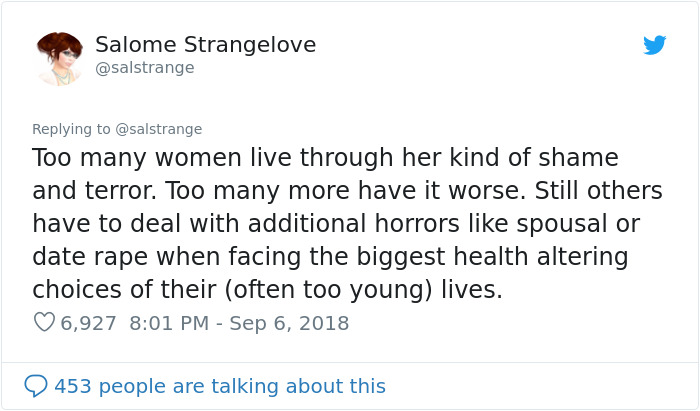


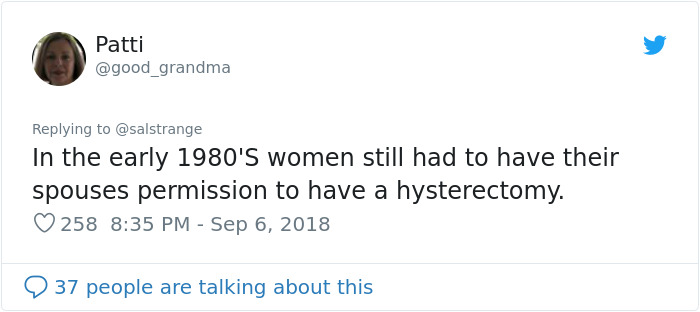

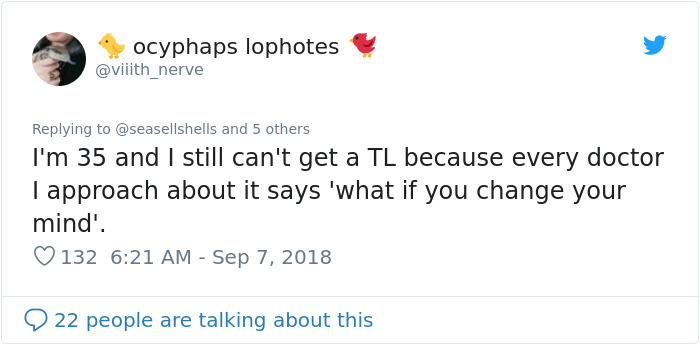

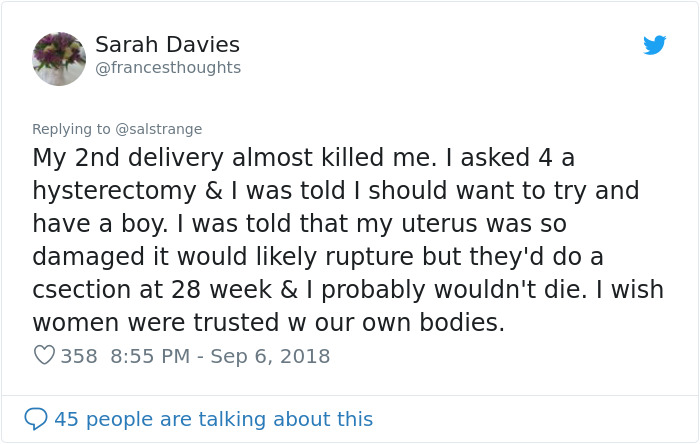




211
176